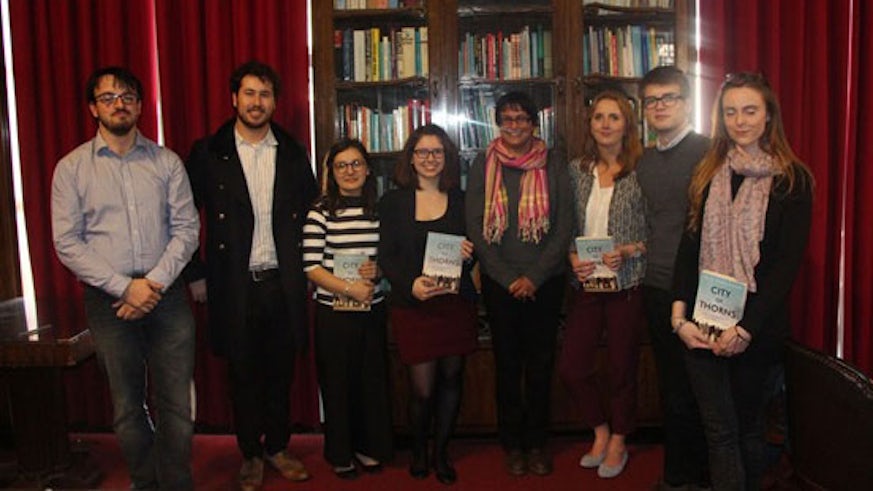Global Justice Showcase
26 May 2016

This May the School of Law and Politics Global Justice Pro-Bono programme held an event to showcase the work of students carried out during the 2015-2016 academic year. The event was co-hosted with the Welsh Centre for International Affairs and took place at the Temple of Peace in Cardiff.
The Global Justice Pro Bono programme was established within the School’s award-winning Law Clinicwith the support and advice of the Hingorani Foundation, New Delhi, which supports practical training for law students in advocacy for social justice. The Foundation is named after the late Kapila Hingorani, a pioneer of public interest litigation in India and the first South Asian woman to graduate from Cardiff University (1947)
The Global Justice programme ran as a pilot in 2015-16 under the supervision of Professors Ambreena Manji, Julie Price and John Harrington. From a large number of applicants, six undergraduate students were selected to take part. They have worked closely with Deighton Pierce Glynn solicitors, London and Bristol and with Amnesty International in London and Nairobi.
The case on which the students worked was selected through discussions with Deighton Pierce Glynn and draws on the underlying research of Ambreena Manji and John Harrington on road building and the right to the city in Kenya; on social and economic rights including the right to housing and the right to health in Kenya’s 2010 Constitution; on the legal framework governing UK development aid; and on judicial review of aid decisions.
The workshop provided an opportunity for students to showcase their ongoing research on the legal and political background to the ‘Kenya Slum Clearance Case’ and on the specific problems and opportunities for securing effective accountability for possible human rights violations in this context.
Opening the workshop, Professor John Harrington said that the Global Justice programme was inspired by legal theorist William Twining’s challenge to take a truly cosmopolitan approach to legal education. Participating students had moved beyond the traditional Britain and Europe-centred view of law, engaging with international, regional and national legal systems relevant to securing accountability in the case. A combination of socio-legal and blackletter skills was necessary to ‘take suffering seriously’, as the Indian legal scholar Upendra Baxi has put it and the students had clearly done this in their project.
The students then presented their work in two sessions. First setting the context and giving an overview of the relevant Kenyan legislation and then considering the avenues of accountability in European and UK law. They ably fielded questions on both parts of their presentation and provoked a lively discussion among the audience as to the means of doing justice in these cases. Members also shared useful insights on how this model of clinical legal education could be developed in future.
The event also included presentations by practitioners in the field of research and advocacy on law and global justice. Daniel Cullen, Programme Assistant, human rights and refugees at the Quaker United Nations Office, Geneva spoke on children and international law and Justin Prosser of Hub Cymru gave a lecture on the campaign for the Well Being of Future Generations (Wales) Act 2015.
Speaking of the students’ work, Professor Ambreena Manji said ‘our students are to be congratulated on their commitment to developing a legal strategy for this case. Our preparation was very wide-ranging: from Kenya jurisprudence on the right to housing, to the politics of road building, from the legal framework for UK development assistance to judicial review.’ Adam Hundt, partner at DPG, thanked the students for their thoroughness in preparing a detailed legal brief. Malavika Vartak from Amnesty International added that she would now be discussing the students’ proposals and strategy with colleagues in Nairobi and London, and thanked the students for their work during the academic year.
All involved were delighted with the Global Justice showcase event. Cardiff School of Law and Politics is working with Deighton Pierce Glynn to build on the pilot Pro-Bono Programme and open it to a new cohort of students next year.
The School is grateful to Ede and Ravenscroft for making a bursary available to fund three students who gained valuable work experience in the summer of 2015 to put in place the foundations for the pilot and to our Careers and Employability Service for facilitating that opportunity.